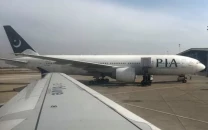Drone buzz
The world has “a potent new weapon” and now it needs to adapt it to international law: The Economist.

There is no information in the public domain as yet if the Pakistani demarche would restrict itself to questions of sovereignty and management of public opinion in Pakistan or also touch upon numerous other issues including the legal and ethical implications of the use of killer machines — flying robots — that are being debated all over the world. Some of these issues got highlighted not so much by the civilian death toll on Pakistani soil as by the assassination of Anwar al-Awlaki, a US citizen by a drone in Yemen.
A brief reference to some of the points raised in the debate may be in order. First and foremost, there is the persistent argument that deaths caused by drone attacks, especially the civilian deaths, have actually helped al Qaeda and the Taliban to recruit more volunteers. Secondly, there is the concern that the campaign has almost abolished the otherwise sacrosanct legal obligation to capture and bring to trial the criminals and suspects in question. Third, there have been misgivings about the procedures with which victims are selected. The fact that President Obama has put himself at the apex of this process of ‘nomination’ has been supported and attacked. The supporters have argued that it reflects the great care and discretion that a liberal president exercises while authorising killings by CIA’s drones. The opposing opinion is that the actual process involves a weekly list by numerous intelligence sources of proven terrorists and ‘suspects’ based on circumstantial evidence and that the presidential scrutiny cannot be foolproof. It is an important point with a bearing on the Pakistani offer to act on drone intelligence. Will the Pakistani authorities carry out any confirmatory procedures of their own or just carry out the recommendations made by the CIA? Parliament has an inescapable responsibility to elicit more information on Pakistan’s alternative plan, even if it is shot down in Washington.
Similarly, the entire defence of drone deaths on the ground that civilian deaths are only a fraction of the enemy combatants killed by them has been questioned by analysing the counting method, which according to troubled US officials considers “all military-age males in a strike zone as combatants”. This is outrageous and parliament should ensure that the government publishes a list of all the dead and wounded whether the drone stroke is unauthorised as now or in future strikes by drones or F-16s, if the alternative plan is ever accepted.
It is a measure of unease about the legal and moral questions that efforts are made to construct a moral justification of killings by UAVs. The main argument is that compared with other methods the percentage of innocents who perish while terrorists are hunted is small. This argument is taken to absurdity when the apologists say that drones do away with the need to stage another Dresden or another Tokyo fire storm. These war time atrocities had complex motivations with the preponderant calculation that mass destruction was necessary to break the will of Nazi Germany and militaristic Imperial Japan.
The issues connected with drone strikes should not be obfuscated in the name of expediency as the UAV systems are the weapon of choice for the future and are registering an astonishing growth rate in production and deployment. Not to be forgotten is the fact that before long the US would not be the principal owner of these systems. To re-phrase and modify a comment by The Economist, the world has “a potent new weapon” and now it needs to adapt it to international law.
Published in The Express Tribune, July 23rd, 2012.
















COMMENTS
Comments are moderated and generally will be posted if they are on-topic and not abusive.
For more information, please see our Comments FAQ